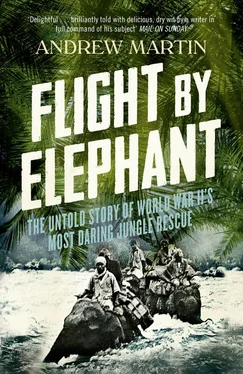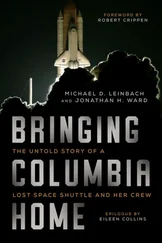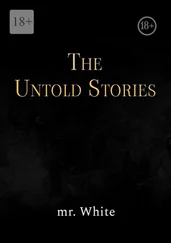– Mr Black: senior liaison officer with the Indian Tea Association relief effort.
– Captain Street: officer in the 2nd Rajputan Rifles.
– Webster: a policeman.
Havildar Dharramsing: Gurkha sergeant and jungle wallah; Mackrell’s principal assistant in the later stages of the mission.
AUTHOR’S NOTE CONTENTS Title Page FLIGHT BY ELEPHANT The Untold Story of World War II’s Most Daring Jungle Rescue Maps Principal Characters Author’s Note Introduction Millar and Leyden: The Men Without Elephants The Languorous Dream The Dapha River The Red-Hot Buddhas The Man in the River Beyond Mandalay The Railway Party The ‘Chaukan Club’ Sets Off The Footprint The Man With Elephants The Boy Who Took Acidalia trigeminata Sir John Meets the Commandos The Wizard’s Domain A Bad Start for Mackrell War And Tea (Part One) War And Tea (Part Two) Captain Wilson Sets Out Elephant Trouble for Mackrell Mackrell Reaches the Dapha River Sir John Encounters His Principal Enemy The Man in Sunglasses Mackrell Consolidates at the Dapha River Captain Wilson Arrives at the Dapha Havildar Iman Sing The Commandos Despair of Reaching the Dapha Grand Tiffins and the Squits The Drop Momentous Decisions Mackrell Returns Temporarily to Civilization Mackrell in Shillong and Calcutta The Society of Tough Guys A Face Like Wood: Dharramsing Decides A Delivery of Mail A Long Wait Subsequently (Part One) Subsequently (Part Two) Late Period Mackrell Select Bibliography Acknowledgements About the Author Praise Also by Andrew Martin Copyright About the Publisher
This book is principally – and closely – based on the diaries of Guy Millar, Gyles Mackrell, Sir John Rowland, Captain Reg Wilson, Second Lieutenant Bill Howe and Ritchie Gardiner. Given the circumstances it is amazing that these diaries were written at all, but they are often sparse, and sometimes dwindle into telegraphese. Therefore, I have made some small embellishments. All quoted speech is as recorded in the diaries, but sometimes I have speculated as to a character’s thoughts based on the preoccupations of the particular day and time as transcribed.
I have occasionally tried to evoke jungle scenes based on my having visited the jungles in question rather than because they are precisely so described in the diaries. And if, say, Gyles Mackrell mentions that it is raining on Thursday and Saturday, I might have concluded – given that he was in the middle of a monsoon – that it was raining on the Friday in between. I contend that it would be impossible to tell this story without such interventions, and it is a story that deserves to be told.
Andrew Martin
INTRODUCTION CONTENTS Title Page FLIGHT BY ELEPHANT The Untold Story of World War II’s Most Daring Jungle Rescue Maps Principal Characters Author’s Note Introduction Millar and Leyden: The Men Without Elephants The Languorous Dream The Dapha River The Red-Hot Buddhas The Man in the River Beyond Mandalay The Railway Party The ‘Chaukan Club’ Sets Off The Footprint The Man With Elephants The Boy Who Took Acidalia trigeminata Sir John Meets the Commandos The Wizard’s Domain A Bad Start for Mackrell War And Tea (Part One) War And Tea (Part Two) Captain Wilson Sets Out Elephant Trouble for Mackrell Mackrell Reaches the Dapha River Sir John Encounters His Principal Enemy The Man in Sunglasses Mackrell Consolidates at the Dapha River Captain Wilson Arrives at the Dapha Havildar Iman Sing The Commandos Despair of Reaching the Dapha Grand Tiffins and the Squits The Drop Momentous Decisions Mackrell Returns Temporarily to Civilization Mackrell in Shillong and Calcutta The Society of Tough Guys A Face Like Wood: Dharramsing Decides A Delivery of Mail A Long Wait Subsequently (Part One) Subsequently (Part Two) Late Period Mackrell Select Bibliography Acknowledgements About the Author Praise Also by Andrew Martin Copyright About the Publisher
In the monsoon season of 1942, deep in the jungles of the Indo-Burmese border, Captain Reg Wilson wrote of our principal, Gyles Mackrell, that he ‘knew what an E. could do’. An ‘E’ was an elephant.
Mackrell knew how to manage elephants as beasts of burden; he also knew how to kill an elephant with a single bullet if – and only if – it had gone rogue. He knew how to manage the elephant riders, or mahouts, who were known to be stroppy, a tendency exacerbated in many cases by a bad opium habit. If a cane and rope suspension bridge had been washed away by a swollen river, Mackrell knew whether it might be possible to cross that river on the back of an elephant; he knew which of any given herd of elephants might be best suited by strength and temperament to attempt the feat, and whether it might be best accomplished by the elephant swimming or wading. He would be perfectly willing to climb aboard the elephant himself rather than leave the job to the mahouts because he was a man who not only enjoyed a physical challenge, he also seemed to live for risk taking.
Gyles Mackrell went to the sort of minor English public school where the sinks had two cold taps, where a lecture on the Benin Massacre was classed as ‘entertainment’, where visiting military men donated leopard skins and trophy animal heads for the adornment of the library rather than books, and where the pedagogical aim was to produce young men capable of assuming the white man’s burden. It was not an intellectual environment and Mackrell was certainly no intellectual. In an age when ‘bottom of the class’ was an official status (since the rankings were published every term) Mackrell repeatedly occupied that very position. Yet he had great practical intelligence, and the diaries disclose an elegant, spare writing style. He was not the all-purpose ‘hearty’: he does not seem to have featured in any of the first, second, or even third elevens; his school did not make him one of those Edwardian boors with a caddish moustache and a racist turn of phrase, but in his late teens he did have a hankering after a life of adventure, and the British Empire was there to provide it. So Gyles Mackrell became a tea planter in Assam, India.
Unlike Australia or Canada, British India was not a colony in the literal sense. Its only settlers were the tea planters. In order to create their plantations they had to clear the jungle, but the jungle kept coming back. The tiger wandering through the living room of the bungalow was not an unknown sight to the Assamese planters and their wives, who wore galoshes in their flower gardens against snake bites. Elephants, when they were behaving, were the planters’ allies in the animal kingdom, whether they were used for uprooting trees – which an elephant does by leaning casually on the tree – or for carrying cargo, or simply as a runabout: a means of getting the planter to his club for the six o’clock whisky and soda. A late nineteenth-century manual for aspirant tea planters describes the elephant as ‘the most useful brute in Asia’.
Before the First World War, the planters’ main enemy was Mother Nature. Their military involvement had been confined to membership of picturesque part-time cavalry regiments which, in between mess lunches and polo tournaments, mounted occasional expeditions against troublesome local tribes. The First World War did not touch the tea planters of Assam directly, although many of them volunteered to fight in Europe or the Middle East. Gyles Mackrell himself chose the almost suicidal option of becoming a fighter pilot on the Western Front with the Royal Flying Corps, a job carrying an average life expectancy shorter even than the six weeks an infantry officer could bargain for. Later in the war he was posted to conduct what were mainly surveillance operations against the rebellious Muslim tribes on the North-Western Frontier. In the flimsy death-trap planes of the time, Squadron Leader Mackrell, as he had now become, patrolled the skies over Waziristan in temperatures of 120 degrees Fahrenheit. At any one time more than half the flyers engaged on such missions were sick, which is not to say that the peril was not greater for the tribesmen beneath, who were sometimes bombed in their mud huts.
Читать дальше












